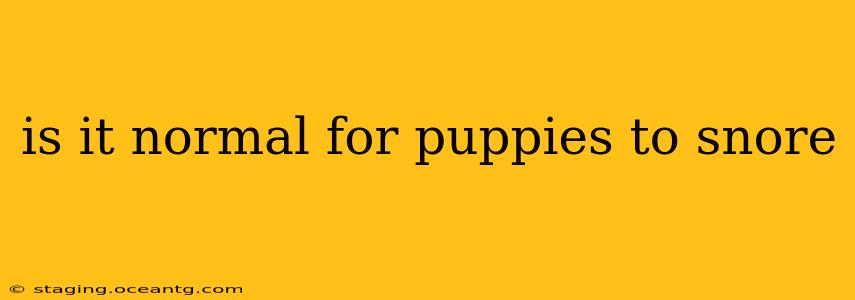Many new puppy owners find themselves wondering, "Is it normal for puppies to snore?" The short answer is: sometimes, yes. But understanding why your puppy snores is crucial to ensuring their health and well-being. While occasional snoring is often harmless, persistent or loud snoring can be a sign of an underlying issue. This comprehensive guide will delve into the reasons behind puppy snoring, when to worry, and what steps you can take.
Why Do Puppies Snore?
Several factors can contribute to puppy snoring. Some are perfectly normal, while others require veterinary attention.
Breed Predisposition:
Certain breeds are more prone to snoring than others. Brachycephalic breeds (those with short noses and flat faces), such as Bulldogs, Pugs, and French Bulldogs, are particularly susceptible due to their unique airway anatomy. Their shortened nasal passages and soft palate can obstruct airflow, leading to snoring. This is largely considered normal for these breeds, although it's still important to monitor for any changes.
Sleeping Position:
Just like humans, puppies can snore if they sleep in a position that partially obstructs their airways. Sleeping on their back, for example, can sometimes lead to snoring. This is usually nothing to worry about, especially if it's infrequent.
Nasal Congestion:
A stuffy nose, whether from allergies, a minor cold, or a foreign object, can cause snoring. If your puppy seems unwell or has other symptoms like sneezing or a runny nose, a vet visit is necessary.
Underlying Medical Conditions:
In some cases, snoring can be a symptom of a more serious underlying medical condition. These might include:
- Obstructive Sleep Apnea: This is more common in brachycephalic breeds and involves pauses in breathing during sleep.
- Allergies: Environmental allergens can irritate a puppy's respiratory system, leading to congestion and snoring.
- Upper Respiratory Infections: These infections can inflame the nasal passages and cause snoring, often accompanied by other symptoms.
- Elongated Soft Palate: This condition, common in brachycephalic breeds, can cause the soft palate to partially obstruct the airway.
- Narrowed nostrils (Stenotic Nares): This is another structural issue more frequent in flat-faced breeds, resulting in restricted airflow.
- Tracheal Collapse: This serious condition affects the trachea (windpipe), making it difficult for your puppy to breathe.
How to Tell if Your Puppy's Snoring is a Cause for Concern?
While occasional, quiet snoring is often benign, pay close attention to these warning signs:
- Loud snoring: If the snoring is excessively loud and disruptive, it warrants a vet check.
- Labored breathing: If your puppy appears to be struggling to breathe, or makes unusual noises while sleeping, seek immediate veterinary attention.
- Blue gums: Blue or grey gums indicate a lack of oxygen, a serious emergency requiring immediate veterinary care.
- Excessive sleepiness: Unusual lethargy or excessive sleepiness could be a symptom of an underlying health problem.
- Snoring accompanied by other symptoms: If snoring is accompanied by coughing, sneezing, discharge from the nose or eyes, lethargy, or loss of appetite, consult your veterinarian.
When Should I Take My Puppy to the Vet?
If you notice any of the warning signs mentioned above, it's crucial to schedule a visit with your veterinarian. Early diagnosis and treatment of underlying medical conditions can significantly improve your puppy's quality of life and prevent more serious complications.
What Can I Do to Help My Puppy Snore Less?
While you can't always prevent snoring, especially in brachycephalic breeds, you can take some steps to make your puppy more comfortable:
- Elevate their head: Using a slightly raised bed or placing a pillow under their head might help improve airflow.
- Maintain a clean environment: Minimize dust and allergens in your home to reduce the risk of nasal congestion.
- Regular veterinary checkups: Regular checkups allow your veterinarian to monitor your puppy's health and identify any potential problems early on.
Remember, this information is for general knowledge and does not replace professional veterinary advice. Always consult your veterinarian if you have any concerns about your puppy's health. Their expertise is vital in determining the cause of your puppy's snoring and recommending the appropriate course of action.
